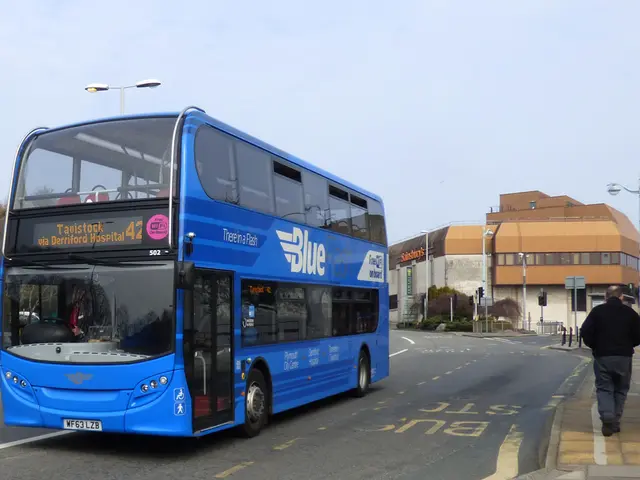Living a Caged Existence: Roberto Saviano's Haunting Question of Guilt
Roberto Saviano is confined and imprisoned, lacking freedom due to constant security measures and threats on his life.
By Andrea Affaticati, Milan
In an interview with the Italian daily "Corriere della Sera," writer Roberto Saviano admits to contemplating suicide numerous times. He's been under police protection for nearly two decades, a burden that few can truly understand.
Born in Naples, Saviano is 44 years old and gained international recognition in 2006 with his storytelling tour de force, "Gomorrah." This book unveiled the inner workings of the Neapolitan mafia—the Camorra—and placed him right in their crosshairs.
Once, Camorra boss Francesco Bidognetti, also known as Cicciotto di Mezzanotte, and his lawyer warned Saviano that he would be dead within five years. At that time, Saviano was 26, and he was given police protection. The trial against the mafia kingpin has been going on for 16 years and still isn't over.
Real Danger or Spectacle?
Aside from the Camorristi wanting him dead, there are also Neapolitans who can't forgive Saviano for painting such a grim picture of his city in "Gomorrah." But his book didn't just reveal the truth; it also shed light on the criminal activities, bringing positive change to some neighborhoods in Naples where one can now walk without fear.
Roberto Saviano belongs to a category of intellectuals who have been coopted by politics. The left holds him up as a shining example, while the right sees him as a troublemaker. National-populist deputy prime minister Matteo Salvini, the Lega chief and infrastructure minister, would love to strip him of his police protection.
Matteo Salvini's political adversaries credit Saviano's courage in shining a light on the Camorra's influence, while those who dismiss his concerns often assume that the ongoing police protection is merely a spectacle. Some even insinuate that it serves to fuel Saviano's own ego.
Parallels with Salman Rushdie
In his interview, Saviano cites Indian-British writer Salman Rushdie, who received a fatwa for his 1988 book, "The Satanic Verses." This religious decree made him a target for Muslims worldwide, and he still faces significant threats.
A substantial bounty has been placed on Rushdie's head, and he has lived in hiding for many years due to the danger. However, at some point, he decided to defy the danger and live freely again. For a while, this approach seemed to serve him well.
That was until the summer of 2022, when Rushdie suffered a stabbing attack that left him seriously injured and blind in one eye. "The irony is that Rushdie now feels relieved," Saviano points out. "No one can claim that the fatwa is just a spectacle anymore."
An Ongoing Struggle
Living under personal protection means enduring two things for Saviano: constant criticism for being overly dramatic and seeking attention, and the never-ending question of how to break free from this self-imposed imprisonment.
When asked if he suffers from panic attacks, Saviano replies candidly: "Constantly. I can't handle it without medication. The worst time of the day is five o'clock in the morning. You can't breathe. You ask yourself: And now? Where do I go? I feel crushed by two burdens. One, because I risk my life, the other, because I'm still alive."
There's also the isolation that comes with his lifestyle. For instance, during the Easter holidays, Saviano had to stay home while his family and friends frolicked in Naples until 4 am. "Of course, I'm happy they had a good time," Saviano says. "But it was hard for me to stay home."
When it comes to love relationships and friendships, they are often affected by his limited mobility. "Especially when it comes to love," Saviano shares. "If I'm interested in someone, and they're interested in me, the relationship never works out."
Love demands freedom, something Saviano never really had. "I once took a selfie with Philip Roth, and he said to me: ‘I would never be jealous of a shitty life like yours.’" Saviano understands his response rather well. He wishes for a different life, a life without fear and danger. But for now, the question of whether he wasted his life remains unanswered, and he continues to torment himself.
Mafia, Italy, Camorra, Isolation, Fear, Loneliness, Resilience
- Living under mafia threats: Danger, fear, and isolation are common experiences for those who find themselves in the crosshairs of organized crime, as exemplified by Roberto Saviano's ongoing struggle against the Neapolitan Camorra.
- Identity and role conflicts: Being a public figure fighting against the Mafia requires a tough, stoic persona in public while dealing with vulnerabilities and fear in private, creating inner psychological tension for those like Saviano.
- Long-term psychological effects: The constant fear and isolation faced by mafia targets under police protection can lead to emotional strain, social disruption, and a complex interplay of fear and resilience. In Saviano's case, the psychological burden of surviving constant threats and enduring social isolation is a profound and on-going struggle.
- The irony of danger: Salman Rushdie's case illustrates that even when the threat subsides, the psychological impacts can linger, as evidenced by Rushdie's relaxation in his dangerous situation being short-lived. The physical attack only served to validate the reality of the ongoing danger for those under threat.
- Political cooptation: Roberto Saviano's position as both politically coopted and reviled by certain factions highlights the complexity of his situation. While some celebrate his bravery, others view him as a dramatist seeking attention—although the relentless danger he faces suggests otherwise.
- Roberto Saviano's employment policy, governed by his decision to expose the Camorra, has resulted in constant risking of his life and enduring traces of isolation and fear.
- Saviano's community policy, based on his book 'Gomorrah', brought significant transformation to certain Naples neighborhoods, providing traces of health-and-wellness and mental-lifestyle improvements.
- The ongoing debate on the veracity of Saviano's danger allegations reveals parallels with Salman Rushdie's career development, as some dismiss the threats as mere spectacle, while others see it as a stepping stone for personal-growth and education-and-self-development.
- In his fight against the Camorra, Saviano experiences an anecdote of emotional rollercoaster, oscillating between moments of courage and debilitating anxiety, often manifesting as panic attacks.
- The fashion-and-beauty and fitness-and-exercise sectors are overlooked in Saviano's life, as he is trapped within a caged existence due to isolation and mafia threats.
- Science's influence in understanding the psychological impacts of prolonged danger on individuals like Saviano is valuable for the development of policies aimed at supporting mafia victims in their pursuit of career-development and personal-growth.
- As the question of whether he wasted his life lingers in Saviano's mind, traces of disappointment, frustration, and loneliness can be seen in his relationships with others, particularly in matters of love and friendship.







